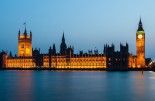PGIM Fixed Income: Katharine Neiss and Guillermo Felices comment on BoE rate hike

Katharine Neiss and Guillermo Felices, respectively Chief European Economist and Global Investment Strategist at PGIM Fixed Income, comment on today's Bank of England rate hike.
Katharine Neiss, Chief European Economist at PGIM Fixed Income:
'The recent acceleration in core inflation and wage growth clearly spooked the MPC into stepping up its pace of interest rate rises from 25bps to 50bps. Moreover, they have signalled more is likely to come.
Whether this step up in the BoE’s fight against inflation is enough remains to be seen, but a faster pace and higher end point for interest rates suggests a hard landing for the UK economy will be difficult to avoid.
More aggressive rate rises could mean the BoE catches up to tame inflation, but given policy lags, there’s a risk that in addition to chasing rates on the way up, the central bank ends up chasing them on the way down as well.'
Guillermo Felices, global investment strategist at PGIM Fixed Income:
'The BoE clearly wants to catch up after falling behind the curve. The problem is that raising rates by 50bp increases the risk of recession in the UK. Markets have already been pricing higher gilt yields, driven by the front end. Flattening pressure is unlikely to change in the spot curve in the near term.
Risky assets, however, have been more resilient so far. I would expect risky asset markets to start putting more weight on the negative growth implications of tighter monetary policy. That means downward pressure on GBP, despite higher interest rates, and selling pressure on spread product and equities.
This dynamic is not new to the UK. This was also the case before the mini-budget rout when higher interest rates and growth concerns led to weaker risky assets and notably GBP. This dynamic is unlikely to change until we see clearer downward pressure on core inflation in the UK.'






